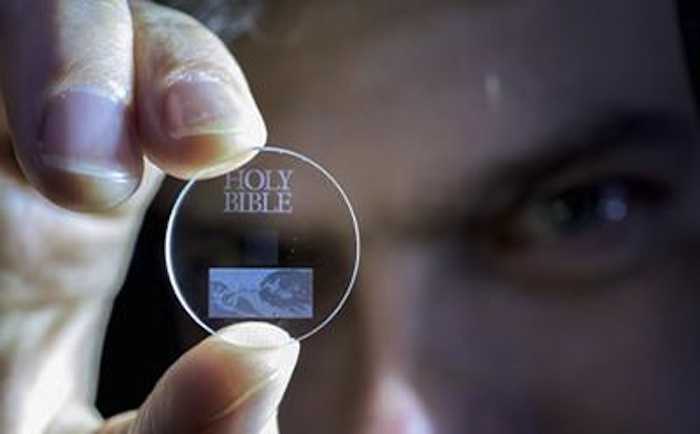
'Superman Memory Crystal' Could Store Data for 13.8 Billion Years

Get the world’s most fascinating discoveries delivered straight to your inbox.
You are now subscribed
Your newsletter sign-up was successful
Want to add more newsletters?

Delivered Daily
Daily Newsletter
Sign up for the latest discoveries, groundbreaking research and fascinating breakthroughs that impact you and the wider world direct to your inbox.

Once a week
Life's Little Mysteries
Feed your curiosity with an exclusive mystery every week, solved with science and delivered direct to your inbox before it's seen anywhere else.

Once a week
How It Works
Sign up to our free science & technology newsletter for your weekly fix of fascinating articles, quick quizzes, amazing images, and more

Delivered daily
Space.com Newsletter
Breaking space news, the latest updates on rocket launches, skywatching events and more!

Once a month
Watch This Space
Sign up to our monthly entertainment newsletter to keep up with all our coverage of the latest sci-fi and space movies, tv shows, games and books.

Once a week
Night Sky This Week
Discover this week's must-see night sky events, moon phases, and stunning astrophotos. Sign up for our skywatching newsletter and explore the universe with us!
Join the club
Get full access to premium articles, exclusive features and a growing list of member rewards.
Copies of the Magna Carta, the Universal Declaration of Human Rights and the King James Bible have now been digitally stored on a piece of glass known as a "Superman memory crystal" that has the capacity to save huge amounts of information for up to 13.8 billion years, researchers say.
Using a method of laser etching, researchers at the University of Southampton, in the United Kingdom, archived these documents, along with Isaac Newton's scientific treatise "Opticks," on coin-size pieces of glass. These tiny discs can survive for billions of years at temperatures of 374 degrees Fahrenheit (190 degrees Celsius). And at room temperature, they can last virtually forever, the researchers said.
"It is thrilling to think that we have created the technology to preserve documents and information and store it in space for future generations," Peter Kazansky, a professor at the university's Optoelectronics Research Centre, said in a statement. "This technology can secure the last evidence of our civilization; all we've learnt will not be forgotten." [Science Fact or Fiction? The Plausibility of 10 Sci-Fi Concepts]
Kazansky and his colleagues first reported their "5D data storage" in 2013 at the Conference on Lasers and Electro-Optics in San Jose, California. The researchers use fematosecond lasers, which are lasers that produce very short pulses, to inscribe information in nanostructured dots that are 5 micrometers apart. These nano-size etchings polarize light that travels through the glass. A combination of a polarizing lens and an optical microscope is all that is needed to "decode" the message, the researchers said.
The 5D moniker refers to the 3D positioning of the nanostructures as well as their size and orientation.
In 2013, the researchers recorded a 300-kilobyte text file, but the capacity of a single glass data disc is 360 terabytes (1,000,000,000 kilobytes), they reported. The discs are stable up to 1,832 degrees F (1,000 degrees C).
Southampton researchers gave the copy of the Universal Declaration of Human Rights as a gift to the United Nations Educational Scientific and Cultural Organization (UNESCO) in early February, part of the closing ceremony of that organization's Year of Light initiative. The scientists call the glass the "Superman memory crystal," a nod to memory crystals in the "Superman" films and comics. According to the university, the researchers are now seeking industry partners to further develop the technology.
Get the world’s most fascinating discoveries delivered straight to your inbox.
Follow Stephanie Pappas on Twitter and Google+. Follow us @livescience, Facebook & Google+. Original article on Live Science.

Stephanie Pappas is a contributing writer for Live Science, covering topics ranging from geoscience to archaeology to the human brain and behavior. She was previously a senior writer for Live Science but is now a freelancer based in Denver, Colorado, and regularly contributes to Scientific American and The Monitor, the monthly magazine of the American Psychological Association. Stephanie received a bachelor's degree in psychology from the University of South Carolina and a graduate certificate in science communication from the University of California, Santa Cruz.
 Live Science Plus
Live Science Plus










